人教版英语七年级下册同步课件:unit12 What did you do last weekend? sectionA-3a-3c(共23张PPT)
文档属性
| 名称 | 人教版英语七年级下册同步课件:unit12 What did you do last weekend? sectionA-3a-3c(共23张PPT) |  | |
| 格式 | pptx | ||
| 文件大小 | 2.3MB | ||
| 资源类型 | 教案 | ||
| 版本资源 | 人教新目标(Go for it)版 | ||
| 科目 | 英语 | ||
| 更新时间 | 2022-05-31 13:46:08 | ||
图片预览

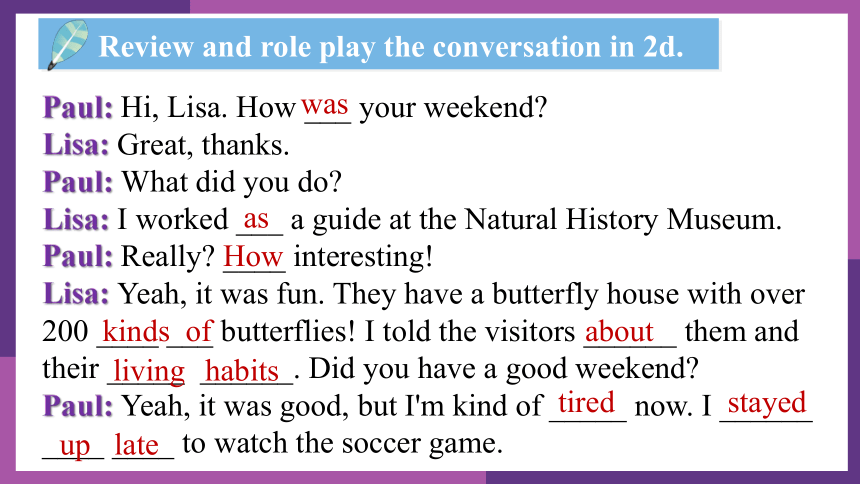
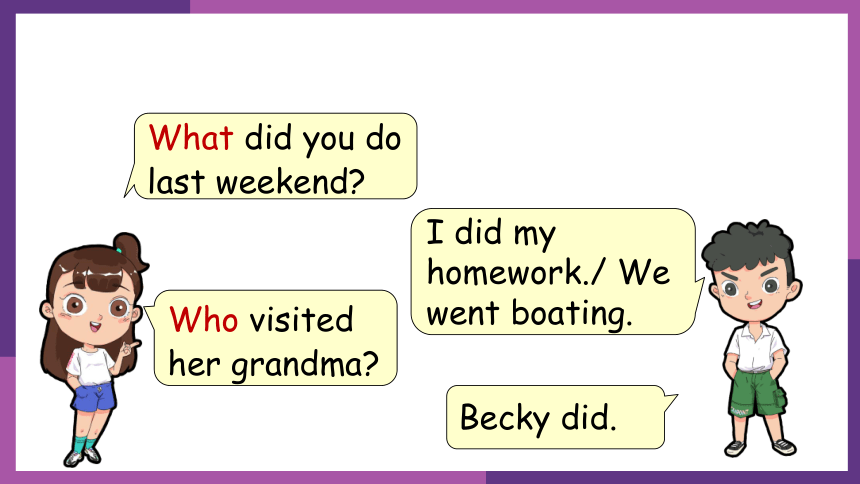

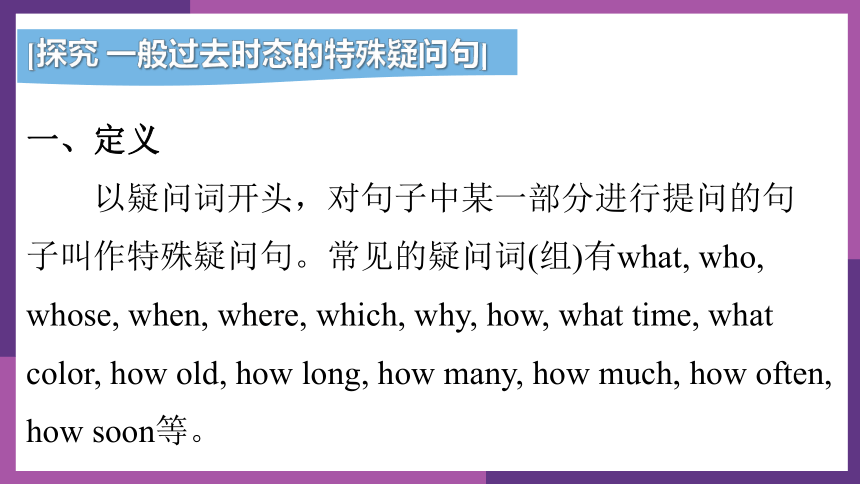
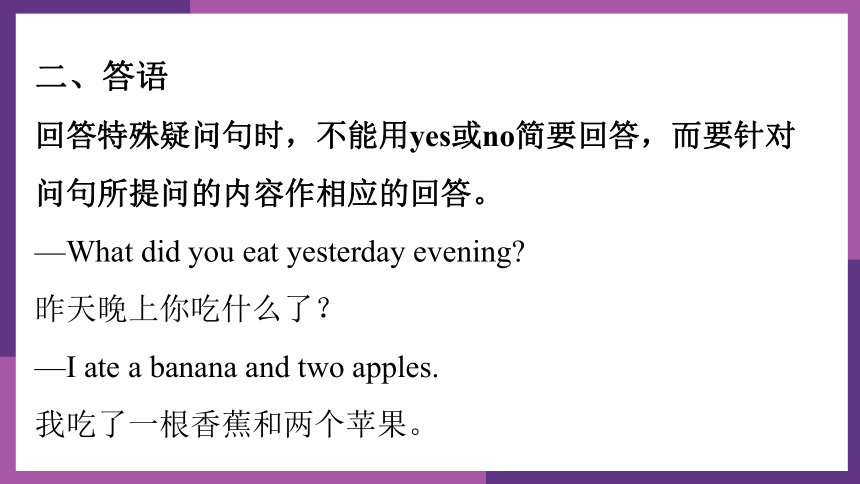

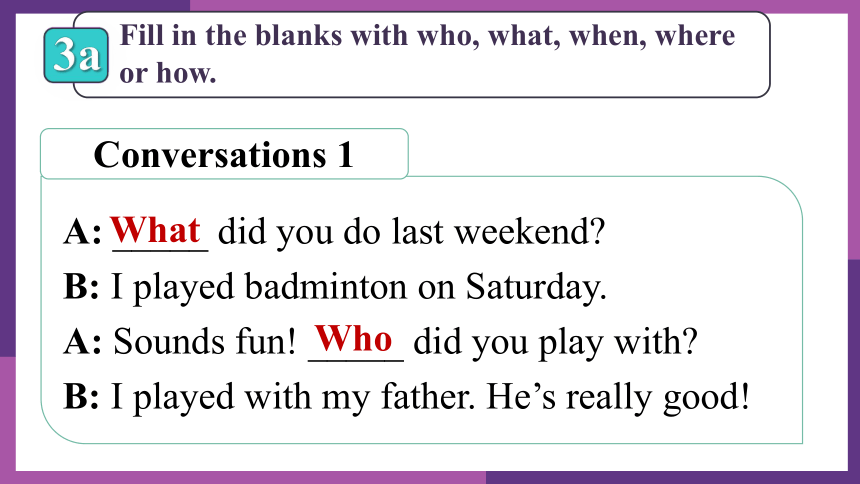
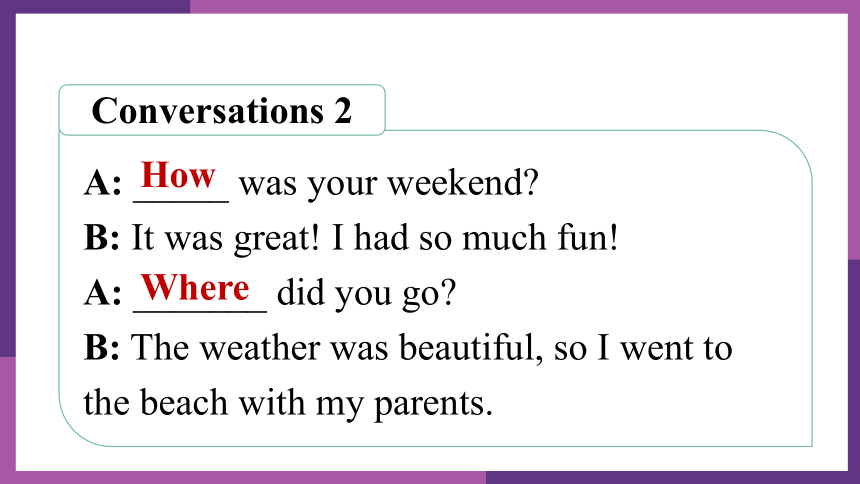
文档简介
(共23张PPT)
Unit12 What did you do last weekend
Section A grammar 3a-3c
Review and role play the conversation in 2d.
Paul: Hi, Lisa. How ___ your weekend
Lisa: Great, thanks.
Paul: What did you do
Lisa: I worked ___ a guide at the Natural History Museum.
Paul: Really ____ interesting!
Lisa: Yeah, it was fun. They have a butterfly house with over 200 ____ ___ butterflies! I told the visitors ______ them and their _____ ______. Did you have a good weekend
Paul: Yeah, it was good, but I'm kind of _____ now. I ______ ____ ____ to watch the soccer game.
as
How
about
living
tired
stayed
kinds of
habits
up late
was
What did you do last weekend
I did my homework./ We went boating.
Who visited her grandma
Becky did.
Where did she go last weekend
She went to a farm.
Who did she go with
She went with her classmates.
一、定义
以疑问词开头,对句子中某一部分进行提问的句子叫作特殊疑问句。常见的疑问词(组)有what, who, whose, when, where, which, why, how, what time, what color, how old, how long, how many, how much, how often, how soon等。
[探究 一般过去时态的特殊疑问句]
二、答语
回答特殊疑问句时,不能用yes或no简要回答,而要针对问句所提问的内容作相应的回答。
—What did you eat yesterday evening
昨天晚上你吃什么了?
—I ate a banana and two apples.
我吃了一根香蕉和两个苹果。
三、一般过去时的特殊疑问句结构
一般过去时的特殊疑问句通常有以下两种情况:
1.特殊疑问词+was/were+主语+其他?
When were you at home
你什么时候在家?
2.特殊疑问词+did+主语+动词原形+其他?
Where did you go last summer
去年夏天你去哪里了?
Fill in the blanks with who, what, when, where or how.
3a
A: _____ did you do last weekend
B: I played badminton on Saturday.
A: Sounds fun! _____ did you play with
B: I played with my father. He’s really good!
Conversations 1
What
Who
A: _____ was your weekend
B: It was great! I had so much fun!
A: _______ did you go
B: The weather was beautiful, so I went to the beach with my parents.
Conversations 2
How
Where
A: _____ did Jim lose
B: He lost his keys. He often loses things.
A: That’s too bad. _____ did he lose them
B: I heard it was yesterday.
What
When
Conversations 3
Complete the passage with the correct forms of the words in the box.
3b
say be climb see run away
A family of mice were in the kitchen on Saturday morning when they _____ a big cat. Baby Mouse _______ afraid and ________ onto his father’s back. Father Mouse shouted at the cat, “Woof, woof! ” The cat quickly _________. “Wow, Dad, you’re good!” ______ Baby Mouse. “Well, son, that’s why it’s important to learn a second language,” answered Father Mouse.
were
saw
climbed
said
ran away
[观察1] In Paris, you don’t often hear people shout in the street.
在巴黎,你不会经常听到人们在大街上叫喊。
His mother shouted at him to wash his clothes.
他母亲大声叫他把衣服洗了。
She shouted to me but I didn’t hear.
她冲我喊,但是我没听见。
He shouted that he wasn't wrong.
他大叫说他没有错。
[探究] shout at多指因为生气等非善意地对某人吼叫;shout to sb.多指因距离远,为了让对方听到而不得不大声叫喊,不含生气等感情因素;“shout+that从句”意为“大声说……”。
[拓展] shout还可以用作名词,意为“喊,叫”。
She ran to me with a great shout.
她欢呼着向我跑来。
(1)不要向你的父母叫喊!
Don’t your parents!
(2)我听见他大声对他的儿子喊:“回来!”
I heard him his son, “Come back!”
活学活用
shout at
shout to
Think of two things you did last weekend. Draw pictures of them. Your classmates guess what you did.
3b
You went to the cinema.
Where did you go
I went to a cinema.
What did you do there
I ate lots of popcorn.
You went to a farm.
Where...
I...
What...
I...
You went to a beach.
Where...
I...
What...
I...
Exercise
1.—________ did your father get home
—At 10:00 p.m.
2.—________ did you go fishing with last weekend
—I went fishing with my uncle.
3.—________ was your bus trip
—It was interesting. And we all enjoyed it.
用适当的疑问词填空
When
Who
How
GOOD JOB
Unit12 What did you do last weekend
Section A grammar 3a-3c
Review and role play the conversation in 2d.
Paul: Hi, Lisa. How ___ your weekend
Lisa: Great, thanks.
Paul: What did you do
Lisa: I worked ___ a guide at the Natural History Museum.
Paul: Really ____ interesting!
Lisa: Yeah, it was fun. They have a butterfly house with over 200 ____ ___ butterflies! I told the visitors ______ them and their _____ ______. Did you have a good weekend
Paul: Yeah, it was good, but I'm kind of _____ now. I ______ ____ ____ to watch the soccer game.
as
How
about
living
tired
stayed
kinds of
habits
up late
was
What did you do last weekend
I did my homework./ We went boating.
Who visited her grandma
Becky did.
Where did she go last weekend
She went to a farm.
Who did she go with
She went with her classmates.
一、定义
以疑问词开头,对句子中某一部分进行提问的句子叫作特殊疑问句。常见的疑问词(组)有what, who, whose, when, where, which, why, how, what time, what color, how old, how long, how many, how much, how often, how soon等。
[探究 一般过去时态的特殊疑问句]
二、答语
回答特殊疑问句时,不能用yes或no简要回答,而要针对问句所提问的内容作相应的回答。
—What did you eat yesterday evening
昨天晚上你吃什么了?
—I ate a banana and two apples.
我吃了一根香蕉和两个苹果。
三、一般过去时的特殊疑问句结构
一般过去时的特殊疑问句通常有以下两种情况:
1.特殊疑问词+was/were+主语+其他?
When were you at home
你什么时候在家?
2.特殊疑问词+did+主语+动词原形+其他?
Where did you go last summer
去年夏天你去哪里了?
Fill in the blanks with who, what, when, where or how.
3a
A: _____ did you do last weekend
B: I played badminton on Saturday.
A: Sounds fun! _____ did you play with
B: I played with my father. He’s really good!
Conversations 1
What
Who
A: _____ was your weekend
B: It was great! I had so much fun!
A: _______ did you go
B: The weather was beautiful, so I went to the beach with my parents.
Conversations 2
How
Where
A: _____ did Jim lose
B: He lost his keys. He often loses things.
A: That’s too bad. _____ did he lose them
B: I heard it was yesterday.
What
When
Conversations 3
Complete the passage with the correct forms of the words in the box.
3b
say be climb see run away
A family of mice were in the kitchen on Saturday morning when they _____ a big cat. Baby Mouse _______ afraid and ________ onto his father’s back. Father Mouse shouted at the cat, “Woof, woof! ” The cat quickly _________. “Wow, Dad, you’re good!” ______ Baby Mouse. “Well, son, that’s why it’s important to learn a second language,” answered Father Mouse.
were
saw
climbed
said
ran away
[观察1] In Paris, you don’t often hear people shout in the street.
在巴黎,你不会经常听到人们在大街上叫喊。
His mother shouted at him to wash his clothes.
他母亲大声叫他把衣服洗了。
She shouted to me but I didn’t hear.
她冲我喊,但是我没听见。
He shouted that he wasn't wrong.
他大叫说他没有错。
[探究] shout at多指因为生气等非善意地对某人吼叫;shout to sb.多指因距离远,为了让对方听到而不得不大声叫喊,不含生气等感情因素;“shout+that从句”意为“大声说……”。
[拓展] shout还可以用作名词,意为“喊,叫”。
She ran to me with a great shout.
她欢呼着向我跑来。
(1)不要向你的父母叫喊!
Don’t your parents!
(2)我听见他大声对他的儿子喊:“回来!”
I heard him his son, “Come back!”
活学活用
shout at
shout to
Think of two things you did last weekend. Draw pictures of them. Your classmates guess what you did.
3b
You went to the cinema.
Where did you go
I went to a cinema.
What did you do there
I ate lots of popcorn.
You went to a farm.
Where...
I...
What...
I...
You went to a beach.
Where...
I...
What...
I...
Exercise
1.—________ did your father get home
—At 10:00 p.m.
2.—________ did you go fishing with last weekend
—I went fishing with my uncle.
3.—________ was your bus trip
—It was interesting. And we all enjoyed it.
用适当的疑问词填空
When
Who
How
GOOD JOB
同课章节目录
- Unit 1 Can you play the guitar?
- Section A
- Section B
- Unit 2 What time do you go to school?
- Section A
- Section B
- Unit 3 How do you get to school?
- Section A
- Section B
- Unit 4 Don't eat in class.
- Section A
- Section B
- Unit 5 Why do you like pandas?
- Section A
- Section B
- Unit 6 I'm watching TV.
- Section A
- Section B
- Review of Units 1-6
- Unit 7 It's raining!
- Section A
- Section B
- Unit 8 Is there a post office near here?
- Section A
- Section B
- Unit 9 What does he look like?
- Section A
- Section B
- Unit 10 I'd like some noodles.
- Section A
- Section B
- Unit 11 How was your school trip?
- Section A
- Section B
- Unit 12 What did you do last weekend?
- Section A
- Section B
